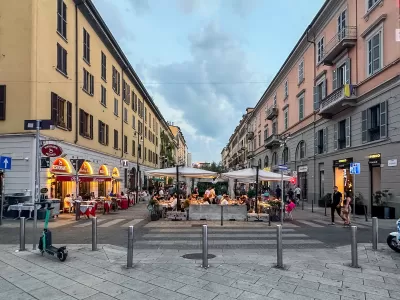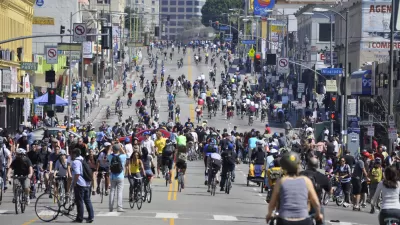The Covid era highlighted social inequities and prompted new paradigms for urbanism and mobility. Will they stick around?

How will urban design and mobility change in the post-COVID city? Scott Shepard shares his thoughts, noting that “After the initial shock and subsequent waves [of the pandemic], a new way of thinking began to quickly take hold.”
Cities around the country and the world began looking for ways to reverse decades- and centuries-old urban design paradigms, spurred both by changes wrought by the pandemic and by the threats of climate change. “This, along with public policies and investments in shared and active modes and a decarbonization of the transport sector collectively pointed towards a brighter future, and one decoupled from the 20th century modernist, car centric urban paradigm.”
Shepard sees promise in the reorganization of society forced by the pandemic and the changes that are persisting as the pandemic winds down. “Much is still needed to be done to help promote and develop in this manner, such as the 15 Minute City and new initiatives to help people take back control of public spaces from the automobile through tactical urbanism and DIY projects. However, this unprecedented era we live in is cause for celebration of our cities, and the potential they bring to a better quality of life for all groups and communities.”
FULL STORY: Urbanism & Mobility in the Post-COVID City

Maui's Vacation Rental Debate Turns Ugly
Verbal attacks, misinformation campaigns and fistfights plague a high-stakes debate to convert thousands of vacation rentals into long-term housing.

Planetizen Federal Action Tracker
A weekly monitor of how Trump’s orders and actions are impacting planners and planning in America.

In Urban Planning, AI Prompting Could be the New Design Thinking
Creativity has long been key to great urban design. What if we see AI as our new creative partner?

King County Supportive Housing Program Offers Hope for Unhoused Residents
The county is taking a ‘Housing First’ approach that prioritizes getting people into housing, then offering wraparound supportive services.

Researchers Use AI to Get Clearer Picture of US Housing
Analysts are using artificial intelligence to supercharge their research by allowing them to comb through data faster. Though these AI tools can be error prone, they save time and housing researchers are optimistic about the future.

Making Shared Micromobility More Inclusive
Cities and shared mobility system operators can do more to include people with disabilities in planning and operations, per a new report.
Urban Design for Planners 1: Software Tools
This six-course series explores essential urban design concepts using open source software and equips planners with the tools they need to participate fully in the urban design process.
Planning for Universal Design
Learn the tools for implementing Universal Design in planning regulations.
planning NEXT
Appalachian Highlands Housing Partners
Mpact (founded as Rail~Volution)
City of Camden Redevelopment Agency
City of Astoria
City of Portland
City of Laramie



























